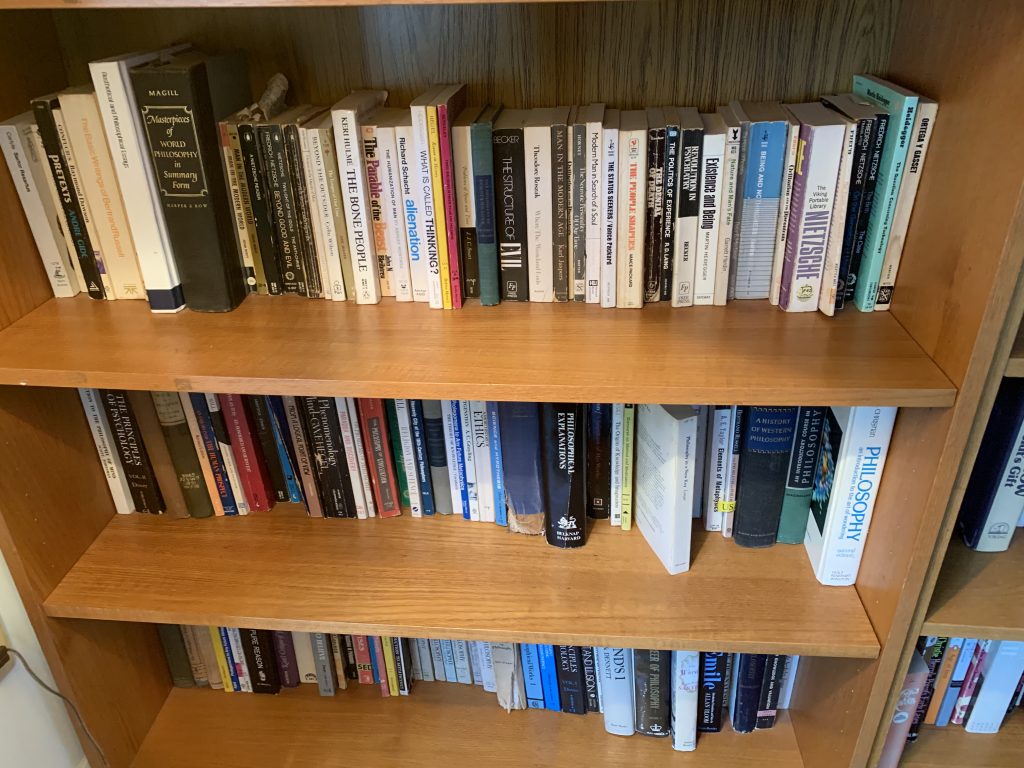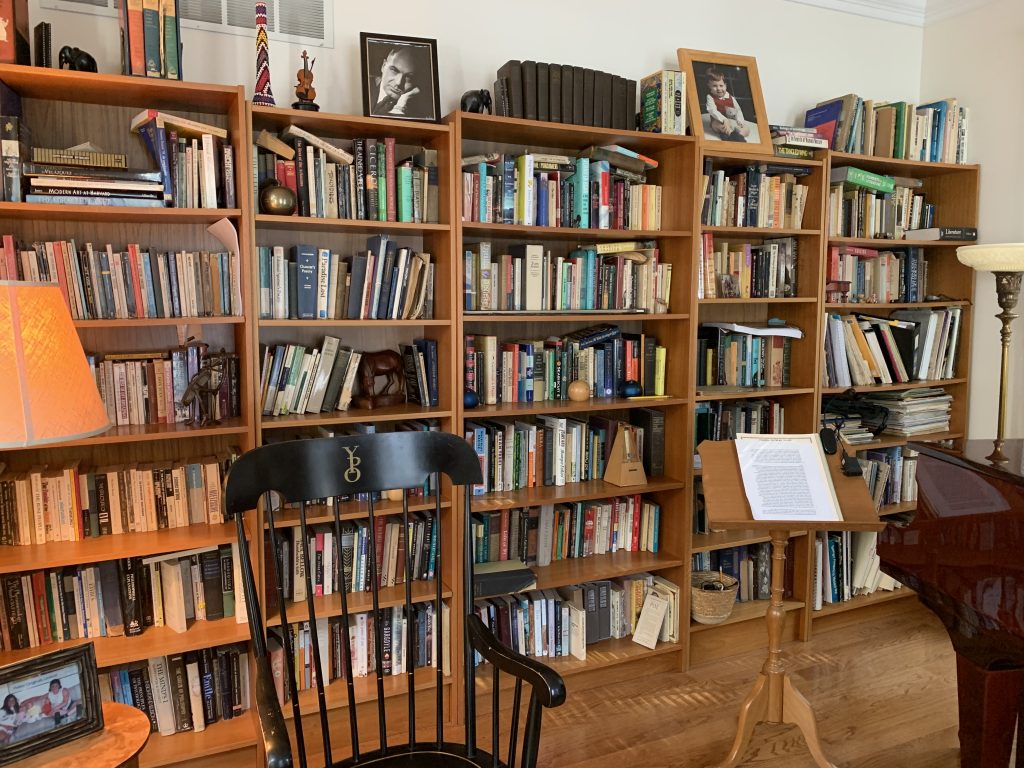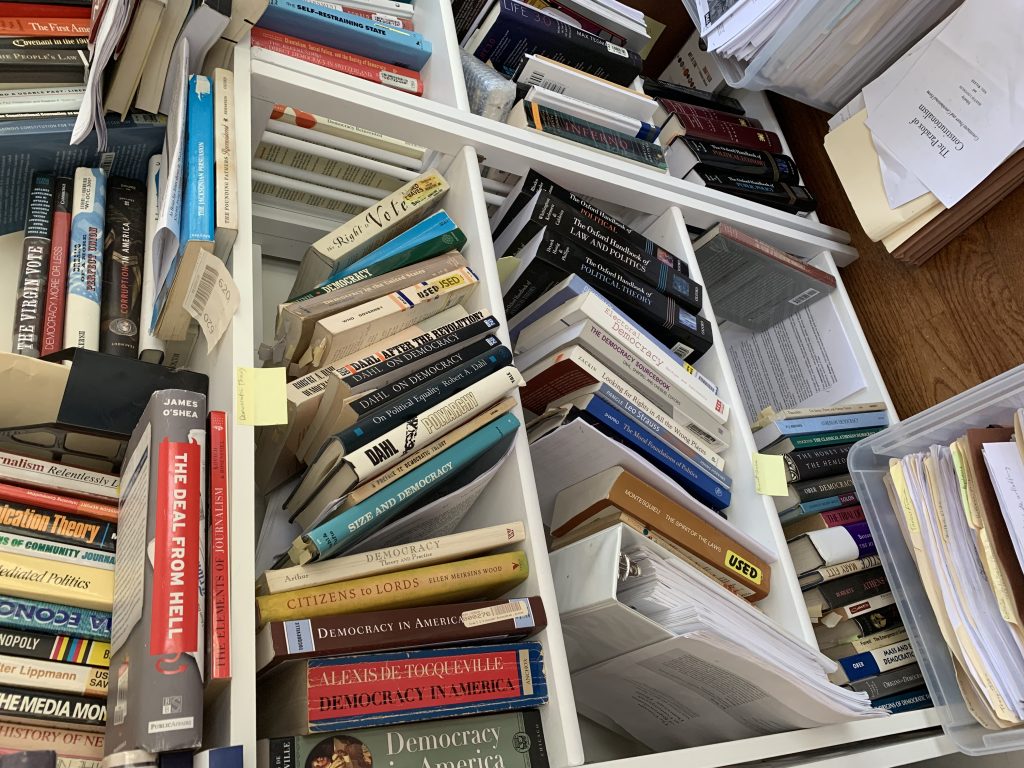AN ARRANGED MARRIAGE: LOVE, BOOKS, AND SHELVING
Money. Religion. Fidelity. Those are supposedly the top issues that destroy relationships. But for some bibliophilic couples, a more challenging issue is how to arrange the books.

MORE
My husband and I share most values, or so we’ve always believed. We have a common religious and educational background. Our lifestyles and life goals are compatible. We even survived a 3-week bicycle trip through 1980’s China before we decided we could spend a life together What we failed to realize, however, was that combining our two book collections would be harder than combining our finances.
It turns out many of our friends, usually academics and/or writers, share this problem. People who love or use or need books turn out to care quite a bit about how to shelve them.
Who Knew Shelving Books Was So Contentious?
Many book lovers with home libraries spend a lot of time thinking about shelving books. Some adamantly believe all books should be alphabetized. Others insist they are most usefully organized by topic, sometimes to the point of creating a home Dewey Decimal system.
Then there are people who believe that all books should be donated after use. Others want to hold onto each book forever, feeling defined and affirmed by their personal library. These people feel the way books are shelved tells the story of their lives.

I ordered my books the way any normal personal would, or so I thought. Fiction went one place, and in alphabetical order by author’s name. American history books went together, as did philosophy books, poetry books, books on Ancient Greece and Rome, religion, and so forth. This system had always worked just fine for me when I was single, and when I needed a book, it was easy to find.
Jim liked to order his books by writing project—his writing project, not mine. putting everything related to telecommunication politics, say, on a shelf. Some of these relationships were pretty esoteric, at least to me. Worse, he added a post-it note to the shelf saying things like “E-Democracy” or “Ancient Greece and Rome.” He could switch these notes around as he went from project to project, reclassifying books along the way.
The problem was, they were his projects, and his classifications, not mine. So I would find that John Stuart Mill, who I had housed under “political philosophy,” would somehow have wandered over to “spectrum policy,” or find Brave New World, which I believed belonged under fiction, with the Jim’s books on information-age politics .
Shared and Protected Space
It turns out we’re not the only couple who has butted heads over book shelving. One friend, S., wrote me a virtual dissertation, complete with pictures, on the way his wife L., a science writer with a home office, solved the problem. (Names abbreviated to protect the innocent!)
Their solution involves having “shared” and “protected” book space. L. has books related to science or writing in her office. S. has books related to his hobbies in his. The shared books are fiction and cookbooks. They organize fiction, like my novels, by author’s name. Novels live in the living room with the television. The shared cookbooks live in the kitchen.

Still, there’s some trouble in paradise. S. says he has to watch all the time to keep L. from putting her work books in the shared space. (He, of course, follows the rules, or so he says.)
It gets better. They actually have a second condo in the same building that houses “overflow books.” These include extra cookbooks, travel books, gardening books, comics and humor, Judaica, poetry, plays, classics, encyclopedias, old textbooks, Sherlock Holmes, a whole shelf devoted to James Joyce, books that they hope to read someday, and books bought on impulse that they might or might not read.
This “second library” covers three walls. And that’s after giving thousands of books away after moving to these condos from a larger house.
Shelving Stories
I don’t think there is a perfect solution. But, please, if you have one, let me know. If I get enough good ideas—or even ideas beyond what I’ve shared here—I’ll share them next month.
You can reach me via the comments section below, the contact form on my website, my Twitter account (@terraziporyn), or the Late Last Night Books Facebook page.
Terra Ziporyn
TERRA ZIPORYN is an award-winning novelist, playwright, and science writer whose numerous popular health and medical publications include The New Harvard Guide to Women’s Health, Nameless Diseases, and Alternative Medicine for Dummies. Her novels include Do Not Go Gentle, The Bliss of Solitude, and Time’s Fool, which in 2008 was awarded first prize for historical fiction by the Maryland Writers Association. Terra has participated in both the Bread Loaf Writers Conference and the Old Chatham Writers Conference and for many years was a member of Theatre Building Chicago’s Writers Workshop (New Tuners). A former associate editor of the Journal of the American Medical Association (JAMA), she has a PhD in the history of science and medicine from the University of Chicago and a BA in both history and biology from Yale University, where she also studied playwriting with Ted Tally. Her latest novel, Permanent Makeup, is available in paperback and as a Kindle Select Book.
- Web |
- More Posts(106)